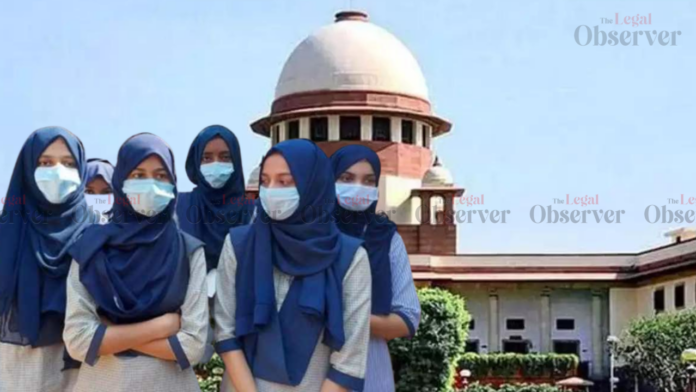The Supreme Court informed the petitioners in the case contesting the hijab prohibition in Karnataka government educational institutions on Thursday that any parallels to the turbans worn by Sikhs would be incorrect. The Supreme Court has recognized turbans worn by Sikhs as one of the five essential components of Sikhism, according to a bench presided over by Justice Hemant Gupta. “We are suggesting comparison with Sikh may not be proper,” Justice Gupta said. “There are requirements on turbans. Five-judge bench of this court declared that wearing turban and kirpan is vital for Sikhs. 5Ks of Sikh has been held to be mandatory.”
For one of the petitioners, attorney Nizam Pasha said that Muslim women’s hijabs serve the same purpose. He explained, “Just like the 5 Ks for Sikhs are the 5 pillars of Islam and that is exactly the position for us. It has been deeply ingrained in Indian culture, Justice Gupta urged, therefore do not compare it to Sikhism. Pasha said, “Similarly, Islam has been practised there for 1400 years, and the hijab is also present.” Relevantly, Pasha added that the ruling by the Karnataka High Court maintaining the hijab ban was almost blasphemous. He said that the High Court had noted that because Quranic laws stretch back more than 1500 years, they are irrelevant today.
He declared, “High Court ruling that passage of the Quran is no longer relevant borders on blasphemy.” On September 12, Senior Counsel Salman Khurshid will present his case at the hearing.
In support of the petitioners, senior advocate Devadatt Kamat stated that only if an outfit disturbs public order can it be prohibited. Senior Advocate K. Parasaran wears a religious emblem, but does it disrupt public order?, he said. “It needs to be seen that my apparel does not fall foul of public order even if it is not a basic religious practise,” he added. But Justice Gupta steadfastly refused to accept it. The other day Dr. Dhavan referenced pagdi, however in Rajasthan people wear pagdi as a matter of routine. In Gujarat also there is pagdi which is matter of routine, am I correct Mr. Mehta (SG), the judge added. “You cannot compare lawyers coming in court since there is a uniform,” the judge remarked.
The same is true for wearing a hijab, according to Kamat, and a violation of public order is the test. “It cannot disrupt public order,” he said.
“You are not offending anyone by wearing a hijab in public. But if you wear that in school then what type of public order are we talking about,” Justice Gupta replied. According to Kamat, maintaining public order is the responsibility of the State, and a constitutional system forbids the use of a “Hitler’s veto.”
“Public order here is duty of the school. If there is a disturbance when I’m wearing a headgear on the road, the police may arrive and force me to take it off because it disrupts the peace. Is Hitler’s veto legal under a constitutional system? There are cases where it has been proven impossible to do so. This is US case which was followed in India by a 2001 verdict,” Kamat contended.
He argued that the State cannot act on the pretext that the public order will be broken. Kamat emphasised that “it is your (the State’s) responsibility to create an environment where I can exercise my right in accordance with Article 25 of the Indian Constitution.” Kamat also gave a justification for his submissions regarding the issue of public order.
Pasha emphasised that the Prophet was referenced in a scripture as saying, “Let there be no compulsion in religion,” and that the High Court had relied on that verse. That was the intention behind “let there be no compulsion,” Pasha argued. “This is a ridiculous misinterpretation of the verse. It is about conversion. Conversion cannot be forced and no one can be converted to Islam if they don’t want to.
Due to misunderstanding of the commentary, the High Court arrives to the conclusion that Hijab is just advised and not necessary in nature, Pasha added. Pasha said that some of the High Court’s opinions are blasphemous.
“The commentator discusses the period of Jahaliyyah, which saw molestations occur and was characterised by a high prevalence of hypocrites. However, the High Court argues that since this is roughly that time, it has no relevance right now. According to the Quran’s last verse, God had finished Islam as a religion for all future times. High Court holding that chapter of Quran is not relevant now anymore borders on blasphemy,” Pasha protested






